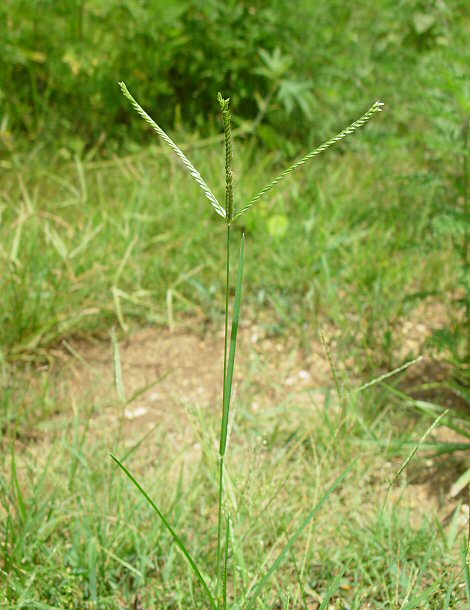Eleusine indica (L.) Gaertn.
Goose Grass

Introduced
CC = *
CW = 3
MOC = 65
© DETenaglia
Eleusine indica (L.) Gaertn.Goose Grass | |
 |
Introduced CC = * CW = 3 MOC = 65 |
© DETenaglia |
|
Family - Poaceae/Eragrostideae Habit - Annual grass, forming tufts. Stems - Flowering stems spreading to ascending, sometimes from a spreading base, to 50 cm, slightly flattened, glabrous.
Leaves - Leaf sheaths keeled, usually along the margins near the tip. Ligule a short membrane with ragged edges. Blades 4-20 cm long, 3-8 mm wide, glabrous or sometimes hairy on the upper surface near the base.
Inflorescence - Terminal, palmate whorl of 3-8 spikes, sometimes with 1-2 spikes below the tip of the axis, the spikes 3.5-12.0 cm long, 3-5 mm wide, spreading or loosely ascending, the whole inflorescence wider than long. Spikes with numerous, dense, sessile spikelets positioned in 2 rows on 1 side of the flattened axis, this not prolonged past the terminal spikelet.
Spikelets - Strongly flattened laterally, with 2-7 florets, disarticulating above the glumes. Glumes unequal in size and shape, the lower glume 1.5-3.5 mm long, oblong-lanceolate, 1-nerved, the upper glume 2.5-4.5 mm long, narrowly ovate, 3-or 5-nerved, both bluntly to sharply pointed at the tip, keeled and with a green stripe along the midnerve, awnless, glabrous or roughened along the midnerve. Lemmas 2.5-4.5 mm long, lanceolate to ovate, sharply pointed at the tip, 3-9-nerved, keeled and with a green stripe along the midnerve, awnless, glabrous. Paleas shorter than the lemmas, 2-nerved, with 2 minute teeth at the tip. Stamens 3, the anthers 0.3-0.8 mm long.
Fruits - Caropses dark reddish brown. Flowering - July - October. Habitat - Pastures, fields, gardens, lawns, cracks in concrete and pavement, roadsides, railroads, open disturbed areas, common in urban areas. Origin - Probably native to Africa. Lookalikes - Broadly, species of Paspalum. Other info. - This species can be found scattered in weed patches throughout Missouri. The plant is easy to identify from its coarse, weedy appearance and multiple, palmately arranged flower spikes. The inflorescence bears a passing resemblance to some Paspalum inflorescences, but is actually very different up close. The plant can be found in tropical and warm regions nearly worldwide. Missouri plants correspond to ssp. indica, as distinguished from ssp. africana, a robust tetraploid with longer lemmas and fruits. Photographs taken in Van Buren, MO., 7-19-03 (DETenaglia); also near Labadie, Franklin County, MO, 10-31-2021 (SRTurner). |